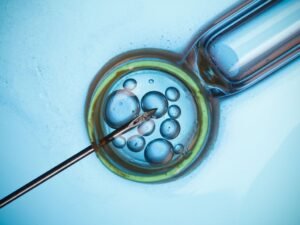What is IVF and When Should it be Considered?
IVF is more successful than intrauterine insemination, another commonly used fertility procedure. Unlike IUI, it can treat almost any infertility problem. In vitro fertilization, also known as IVF, is a common infertility treatment involving fertility drugs to stimulate multiple egg development. The eggs are retrieved from the ovaries using a small needle. They are then fertilized with sperm in a specialized lab. The embryos grow for 3 to 5 days before being placed in the uterus.

Why IVF should be done?
In vitro fertilization is a treatment for infertility or genetic problems. Before you have IVF to treat infertility, you and your partner might be able to try other treatment options that involve fewer or no procedures that enter the body. For example, fertility drugs can help the ovaries make more eggs. And a procedure called intrauterine insemination places sperm directly in the uterus near the time when an ovary releases an egg, called ovulation.
Sometimes, IVF is offered as a main treatment for infertility in people over the age of 40. It also can be done if you have certain health conditions.
IVF may be an option if you or your partner has:
- Fallopian tube damage or blockage. If the fallopian tubes get damaged or blocked, that makes it hard for an egg to be fertilized or for an embryo to travel to the uterus.
- Ovulation disorders. If ovulation doesn’t happen or doesn’t occur often, fewer eggs are available to be fertilized by sperm.
- Endometriosis happens when tissue that’s like the lining of the uterus grows outside of the uterus which often affects the ovaries, uterus and fallopian tubes.
- Uterine fibroids which are common in people in their 30s and 40s. Fibroids can cause a fertilized egg to have trouble attaching to the lining of the uterus.
- Previous surgery to prevent pregnancy. An operation called tubal ligation involves having the fallopian tubes cut or blocked to prevent pregnancy for good. If you wish to conceive after tubal ligation, IVF may help. It might be an option if you don’t want or can’t get surgery to reverse tubal ligation.
- Issues with sperm. A low number of sperm or unusual changes in their movement, size or shape can make it hard for sperm to fertilize an egg.
- A genetic disorder. If you or your partner is at risk of passing on a genetic disorder to your child, your health care team might recommend getting a procedure that involves IVF.
- A desire to preserve fertility due to cancer or other health conditions. Cancer treatments such as radiation or chemotherapy can harm fertility. If you’re about to start treatment for cancer, IVF could be a way to still have a baby in the future. Eggs can be harvested from their ovaries and frozen for later use. Or the eggs can be fertilized and frozen as embryos for future use.

Assisted reproductive technologies (ART), which include IVF, include the use of a donor egg, donor sperm and gestational carrier (surrogate), which can overcome almost all biological infertility limitations. It can also be used for single people and other non-traditional family buildings.
Ayaansh Hospital is the Best IVF Centre in Bangalore & known for its affordable IVF / Fertility Treatment in Indiranagar.
IVF Success Rates
Age is the primary factor that affects IVF success rates. Women younger than 35 have a 50/50 chance of having a baby with their first IVF egg retrieval and subsequent embryo transfer(s). Women who don’t get pregnant following the first IVF cycle still have a very high chance of getting pregnant on the second, third and even more cycles of IVF.
What are the Advantages of IVF?
- IVF is more successful than intrauterine insemination (IUI), another common fertility procedure. Unlike IUI, it can treat almost any infertility problem. It can also provide access to genetic testing of embryos. Further, IVF has a greater capability to prevent multiple births through utilizing single embryo transfer (SET). It is also generally a faster way to get pregnant because success rates are higher.
- IVF can also benefit people wanting more than one child. Often additional frozen embryos not used to get the first pregnancy can be used in the future to attempt to have additional children.
What are the Disadvantages of IVF?
- The disadvantages are that it is a more demanding process than IUI. IUI involves only mild ovarian stimulation, a small amount of monitoring and office-based IUI.
- IVF requires much stronger ovarian stimulation, frequent daily monitoring, an egg retrieval procedure with conscious sedation and anesthesia, laboratory fertilization and embryo growth, usually cryopreservation (freezing) and storage of embryos, and embryo transfer followed by progesterone injections or suppositories.

Decisions to make
Patient factors such as age, fertility diagnosis and family medical history will help women and men decide if the chances are good enough to try IVF. If the chances are very poor, it may be appropriate to consider donor eggs or sperm. Your fertility clinic can refer you to agencies and other sources to obtain these.
Other decisions include:
- Consideration of pre-treatment genetic testing of women and men
- Preimplantation genetic testing (PGT) of the embryo
- Type of treatment cycle, number of embryos to transfer
- Number of embryos to freeze
standard of care, from
consultation to conception



